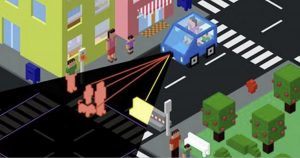Jun 24 2016
Autonomous Cars Sacrificing Their Passengers
 I wrote last year about one aspect of autonomous cars (cars that are capable of driving themselves – autoautos, perhaps) that you might not think of right away but becomes obvious once pointed out: the cars will have to have an algorithm to determine what they do in an emergency situation.
I wrote last year about one aspect of autonomous cars (cars that are capable of driving themselves – autoautos, perhaps) that you might not think of right away but becomes obvious once pointed out: the cars will have to have an algorithm to determine what they do in an emergency situation.
For example, let’s say you are traveling down a road at 40mph and a group of people step out onto the road. The car’s computer calculates that it does not have enough space to come to a stop, so its only option to avoiding hitting the pedestrians is to swerve to the side, but there are obstacles on both sides and therefore swerving will result in a crash which might kill you. What should the car be programmed to do in this situation?
A recent series of surveys explores public opinion about autonomous vehicles (AVs).
To simplify the matter a bit, we can refer to such cars as utilitarian, meaning that their algorithms are designed to minimize the total loss of life without giving priority to the car’s own passengers. You can imagine a number of specific scenarios, but that is the essence of the issue. Should the car minimize risk to its passengers, or to all people equally regardless of their relative position to the car (pedestrian or passenger in another vehicle)?
The surveys indicate that most people agree that AVs should be programmed to be utilitarian, but did not necessarily want to ride in one themselves. Here is a quick summary of the results:
- 76% of participants thought that it would be more moral for AVs to sacrifice one passenger rather than kill 10 pedestrians
- 67% thought that AVs would actually be programmed that way
- Approval for utilitarian AVs increased as the number of pedestrians at risk increased, from 23% for 1 pedestrian, and 76% for 100.
- These numbers decreased when a family member was imagined to be in the car with the passenger
- 50% of respondents said they would buy an AV programmed to protect them, while only 19% said they would by a utilitarian AV.
- Respondents approved more of swerving into 1 pedestrian to save 10 than they were for sacrificing them to save 10.
These results seem fairly predictable. People want AVs to be programmed to save lives generally, and will follow a utilitarian principle generally, but are uncomfortable with sacrificing themselves to save others, and really uncomfortable sacrificing a loved-one to save others.
The authors point out that such attitudes might motivate people to delay adopting AVs, which would delay the overall life-saving feature of such vehicles.
I think the solution in this case is simple education. This is a good example of how you can affect people’s opinions by what information you present to them and how you present it.
You should not ask them whether or not they would want to own a car that would sacrifice them to save 5 strangers. Rather, you can present the overall risk vs benefit – would you buy or use an AV if it significantly reduced your overall risk of being seriously injured or killed in an accident?
While it may be theoretically possible, in a very unusual situation, that the car’s algorithm will put you at risk to save others, it is orders of magnitude more likely that the car will save your life by having an overall reduced risk of accident. Also – you are more likely to one day be one of those 5 pedestrians than to be the passenger who gets sacrificed (assuming risks are evenly distributed, which I know they are not).
It is better for everyone if the cars are programmed to reduce overall risk to everyone. Being selfish is irrational in this case, and increases your overall risk, because if you are allowed to be selfish, other people are as well.
Conclusion
While all of this is interesting, mainly from a human psychology point of view, it seems like it is a non-issue in terms of the AVs themselves. They of course will be programmed to minimize overall risk. This only makes sense. Road deaths will plummet as adoption of AVs increase, and everyone will be happy.
There is an analogy here to vaccines. Vaccines save lives overall, but there are rare adverse events. Public education should not focus on allegedly sacrificing the individual for public health, but rather on the fact that for each individual their risks are decreased by getting vaccinated. You are much more likely to be protected by vaccines than harmed by them. The same will be true of AVs.
I do predict, however, that the occasional rare case of a freak accident in which either the car’s autonomous program failed, or had to sacrifice the passenger to save others, will be widely reported by the media, stoking unreasonable fears and conspiracy theories. Urban legends are sure to appear. Perhaps there will be fringe anti-AV groups. I think Mike Adams already has a web page prepared.
I just hope some idiot politician does not push through a law defending the right of passengers not to be killed by their own car, or something equally ridiculous.






